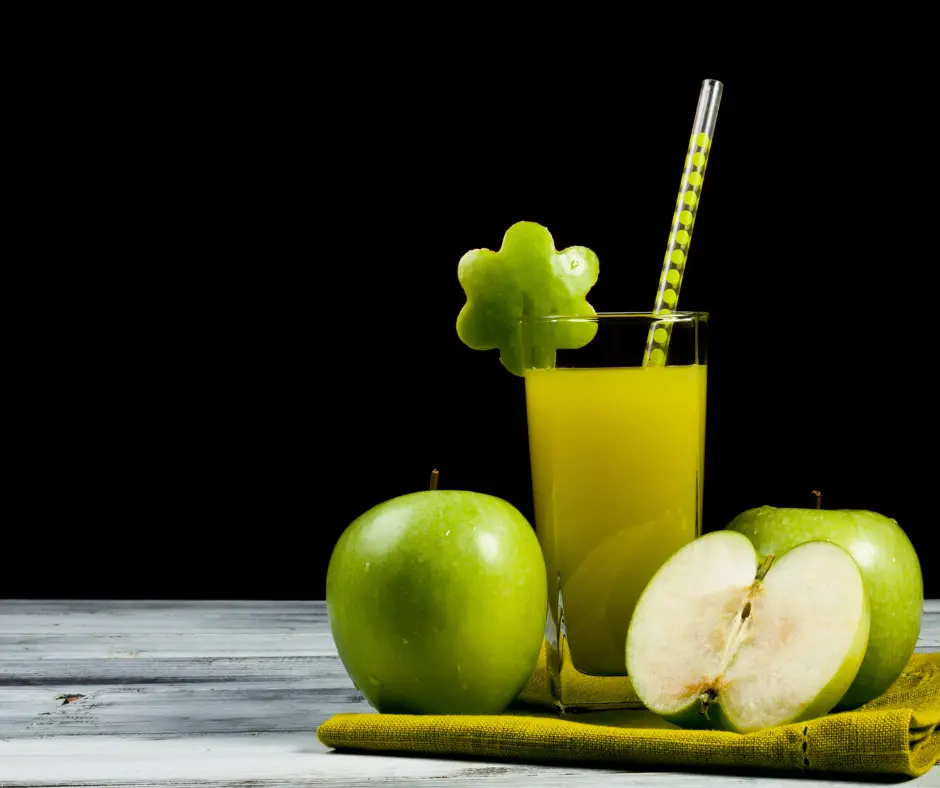Introduction
Apple juice has long been a popular beverage people of all ages enjoy. Not only is it refreshing and delicious, but it is also often touted for its potential health benefits. A common question about apple juice is, ‘Does Apple Juice Make You Poop?‘. In this article, we will separate fact from fiction and clarify the topic of apple juice and its potential impact on bowel movements.

Why Is Apple Juice Popular?
Apple juice is made by extracting the liquid from apples, resulting in a beverage packed with essential nutrients. It is rich in vitamins, minerals, and antioxidants, making it a healthy and nutritious choice. Additionally, apple juice is often favored for its sweet taste, making it popular among children and adults.
Common Questions About Apple Juice And Bowel Movements
Several common questions and misconceptions surround the relationship between apple juice and bowel movements. Let’s address some of these:
- Does apple juice make you poop? While apple juice is often believed to have a laxative effect, the scientific evidence is limited. Some people may experience increased bowel movements after consuming apple juice, but this could be due to the high fiber content in apples rather than the juice itself.
- Does apple juice help with constipation? Apple juice contains dietary fiber, which can help regulate bowel movements and alleviate constipation. The fiber in apple juice adds bulk to the stool, making it easier to pass. Drinking apple juice may temporarily relieve constipation, but it is not a guaranteed solution.
- Is apple juice a suitable remedy for diarrhea? Contrary to the belief that apple juice can help firm up stools during diarrhea, it is recommended to avoid fruit juices, including apple juice, during this time. Fruit juices contain high amounts of sugar that can worsen diarrhea symptoms. Instead, it is advisable to consume clear liquids and electrolyte-rich fluids to prevent dehydration.
Here’s a table summarizing the common questions and answers regarding apple juice and bowel movements:
| Question | Answer |
|---|---|
| Does apple juice make you poop? | Scientific evidence is limited. Some individuals may experience increased bowel movements, but the effect varies. |
| Does apple juice help with constipation? | Apple juice contains dietary fiber, which can aid in relieving constipation. However, it is not a guaranteed solution. |
| Is apple juice a suitable remedy for diarrhea? | Fruit juices, including apple juice, are generally not recommended during diarrhea. Clear liquids and electrolyte-rich fluids are preferable. |
While apple juice is a flavorful and nutritious beverage, its impact on bowel movements varies from person to person. It is important to listen to your body and choose a well-balanced diet that includes a variety of fruits, vegetables, and fiber-rich foods to support good digestive health.
The Fiber Content In Apple Juice
Apple juice is a popular beverage known for its refreshing taste and potential health benefits. One of the key components of apple juice is fiber. Fiber is a type of indigestible carbohydrate that is essential for maintaining a healthy digestive system. It adds bulk to the stool, promotes regular bowel movements, and helps prevent constipation.
Types Of Fiber In Apple Juice
Apple juice contains two main types of fiber: soluble fiber and insoluble fiber. Soluble fiber forms a gel-like substance when it comes into contact with water, while insoluble fiber does not dissolve in water. Both types of fiber are important for promoting healthy digestion.
The soluble fiber in apple juice, such as pectin, helps soften the stool and regulate bowel movements. It also acts as a prebiotic, providing nourishment for beneficial gut bacteria.
Insoluble fiber, on the other hand, adds bulk to the stool and promotes regularity. It helps to prevent constipation by stimulating the digestive tract muscles and speeding up waste movement through the intestines.
How Fiber Affects Bowel Movements?
Consuming apple juice, which is rich in fiber, can positively impact bowel movements. The soluble fiber in apple juice helps to soften the stool and make it easier to pass, preventing constipation. Meanwhile, the insoluble fiber adds bulk to the stool, promoting regular bowel movements.
It’s important to note that while apple juice can contribute to healthy bowel movements, it should not be relied upon as the sole source of fiber in your diet. It’s recommended to consume various fiber-rich foods, such as fruits, vegetables, whole grains, and legumes, to ensure you’re getting an adequate amount of soluble and insoluble fiber.
In conclusion, apple juice contains soluble and insoluble fiber, which can contribute to healthy bowel movements. However, it’s important to maintain a balanced diet that includes a variety of fiber-rich foods to ensure optimal digestive health.
The Role of Pectin in Apple Juice
What Is Pectin?
Pectin is a naturally occurring fiber found in the cell walls of fruits, particularly in apples. It is a complex polysaccharide that provides many benefits to the body, including supporting digestive health and promoting regular bowel movements. Pectin is commonly used in the food industry as a thickener and stabilizer and is also available in supplement form.
How Pectin Supports Digestion and Bowel Movements?
One of the key benefits of pectin is its ability to increase the viscosity and volume of stools, making it useful in managing constipation and diarrhea. Pectin acts as a prebiotic, which means it serves as a food source for beneficial bacteria in the gut. These bacteria ferment pectin and produce short-chain fatty acids (SCFAs), such as butyrate, which help nourish the colon cells and promote healthy bowel movements.
Research has shown that pectin supplementation can improve intestinal barrier function, which is crucial in maintaining gut health. Pectin can help strengthen the tight junctions between intestinal cells, preventing toxins and harmful substances from leaking into the bloodstream. It also supports the immune system by enhancing the production of immunoglobulins, such as IgA, which help protect against pathogens and maintain a healthy balance of gut bacteria.
While apple juice contains some pectin, the concentration may vary depending on the processing method. Clear apple juice has a lower pectin content than cloudy apple juice, which contains more of the fruit’s natural fibers. It is important to note that consuming whole apples or apple juice with pulp may provide more pectin than filtered juices.
Here’s a table summarizing the role of pectin in apple juice:
| Benefits of Pectin in Apple Juice |
|---|
| Supports digestive health |
| Increases stool viscosity and volume |
| Acts as a prebiotic |
| Strengthens intestinal barrier |
| Supports immune function |
In conclusion, pectin is an important component of apple juice that contributes to digestive health and promotes regular bowel movements. However, it’s worth noting that pectin content may vary depending on the processing method of the juice. To maximize the benefits of pectin, opt for cloudy apple juice or consume whole apples with the skin, which are excellent sources of this beneficial fiber.
Apple Juice And Hydration

When it comes to bowel movements, hydration plays a crucial role. Staying properly hydrated helps to soften stool and promote regularity. One popular beverage that is often associated with bowel movements is apple juice. Let’s separate fact from fiction and see how apple juice can support hydration and bowel movements.
The Importance Of Hydration For Bowel Movements
Drinking enough fluids is essential for maintaining healthy bowel movements. The stool can become hard and difficult to pass without proper hydration, leading to constipation. Water is the best choice for hydration, as the body easily absorbs it and aids in softening the stool.
How Apple Juice Can Support Hydration?
Apple juice can be a helpful addition to a hydrating routine due to its high water content. It can provide hydration along with some added nutritional benefits. However, it is important to note that apple juice alone should not be relied upon as the sole source of hydration. The best approach is to incorporate a variety of fluids, including water, in your daily routine to ensure adequate hydration.
Here’s a quick comparison between the hydration benefits of water and apple juice:
| Hydration Beverage | Water | Apple Juice |
|---|---|---|
| Water Content | High | High (with added sugars) |
| Nutritional Benefits | None | Vitamins and Antioxidants from apples |
| Calorie Content | None | Moderate (due to natural sugars) |
While apple juice can contribute to hydration, it is important to be mindful of portion sizes and the added sugars in some varieties. It is generally recommended to choose 100% apple juice without added sugars and enjoy it in moderation as part of a balanced diet.
Remember, maintaining hydration is key for promoting healthy bowel movements. Incorporating a variety of fluids, including water and apple juice, can help support proper hydration and contribute to regularity.
Apple Juice And Gut Health
There are claims that apple juice can improve gut health and promote regular bowel movements. Is there any truth to these statements? Let’s separate fact from fiction and explore the relationship between apple juice and bowel movements.
The Impact Of Apple Juice On Gut Microbiota
The gut microbiota refers to the community of microorganisms that live in our digestive tract. These microbes play a crucial role in maintaining gut health and overall well-being. Some studies suggest that apple juice may positively impact gut microbiota.
Apple juice contains dietary fibers and polyphenols known to have prebiotic properties. Prebiotics are compounds that promote the growth and activity of beneficial bacteria in the gut. The fibers in apple juice can fuel these beneficial bacteria, helping them thrive and maintain a healthy balance in the gut.
Furthermore, the polyphenols in apple juice have antioxidant and anti-inflammatory properties, which may contribute to maintaining a healthy gut environment. They can help reduce oxidative stress and inflammation in the gut, which are associated with various digestive disorders.
How Does Gut Health Affect Bowel Movements?
Bowel movements are influenced by the health and function of the digestive system, including the gut microbiota. When the gut microbiota is balanced and diverse, it promotes efficient digestion and regular bowel movements. On the other hand, an imbalance or dysbiosis in the gut microbiota can lead to digestive problems, such as constipation or diarrhea.
A healthy gut microbiota produces short-chain fatty acids (SCFAs), which are vital in regulating bowel movements. SCFAs provide energy to the colon cells and stimulate muscle contractions, helping move waste through the digestive system. They also increase water absorption in the colon, preventing stool dehydration and promoting soft, regular bowel movements.
Apple juice may indirectly support regular bowel movements by promoting healthy gut microbiota. However, it’s important to note that individual responses may vary, and the effects of apple juice on gut health and bowel movements may depend on factors such as overall diet, lifestyle, and individual health conditions.
In conclusion, while apple juice may have potential benefits for gut health, it’s essential to maintain a well-rounded and balanced diet that includes a variety of fruits, vegetables, whole grains, and other sources of dietary fiber. Consulting with a healthcare professional or registered dietitian can provide personalized guidance on improving gut health and ensuring regular bowel movements.
Apple Juice And Constipation – Does Apple Juice Make You Poop?
When relieving constipation, many people turn to natural remedies like apple juice. But Does Apple Juice Make You Poop? Let’s explore the facts and debunk any misconceptions.
Can Apple Juice Relieve Constipation?
It is commonly believed that apple juice can help relieve constipation due to its high fiber content. While apples themselves are a good source of dietary fiber, it’s important to note that juicing removes most of the fiber. As a result, apple juice may not be as effective in relieving constipation as whole apples.
However, apple juice can still contribute to hydration, which is crucial for maintaining healthy bowel movements. Staying hydrated helps soften stools and promotes regularity. So, while apple juice may not directly alleviate constipation, it can support overall digestive health by keeping you hydrated.
Here’s a quick comparison of the fiber content in whole apples versus apple juice:
| While Apple (Medium) | Apple Juice (1 cup) | |
|---|---|---|
| Fiber Content | 4 grams | 0.2 grams |
| Water Content | 86% | 88% |
As you can see, whole apples contain significantly more fiber than apple juice. Therefore, to increase your fiber intake for better bowel movements, it’s best to have whole apples or include other fiber-rich foods in your diet.
Does Apple Juice Cause Diarrhea?
While apple juice is generally considered a gentle and well-tolerated beverage, consuming excessive amounts may lead to diarrhea. This is because apple juice contains sugars like fructose, which can have a laxative effect in large quantities.
It’s important to consume apple juice in moderation and listen to your body’s response. If you notice any digestive discomfort or loose stools after drinking apple juice, it’s a sign to reduce your intake.
To summarize, apple juice alone may not be a powerful solution for constipation relief due to its lower fiber content than whole apples. However, it can contribute to hydration and support overall digestive health. Remember to incorporate a well-balanced diet with plenty of fiber-rich foods and stay hydrated for optimal bowel movements.
Apple Juice Vs. Apple Cider For Bowel Movements

When maintaining regular bowel movements, there is often confusion about whether apple juice or apple cider is more effective. Let’s look at the differences between apple juice and apple cider and determine which is better for promoting healthy digestion.
Differences Between Apple Juice And Apple Cider
Apple Juice: Apple juice is made by extracting the liquid from apples and removing the pulp. It is typically pasteurized and often has added sugars and preservatives to enhance the flavor and increase shelf life. Apple juice is known for its sweet taste and is commonly consumed as a refreshing beverage.
Apple Cider: Apple cider, on the other hand, is made by crushing fresh apples and extracting the juice. It is typically unfiltered and unpasteurized, giving it a cloudy appearance. Apple cider is known for its tangy and full-bodied flavor, often consumed during the fall season as a traditional beverage. It retains more of the natural nutrients and fibers in apples than in apple juice.
Which Is Better For Bowel Movements?
In promoting healthy bowel movements, apple juice, and apple cider can be beneficial due to their high fiber content. The fiber in apples, especially the insoluble fiber called pectin, adds bulk to the stool and helps regulate bowel movements.
However, apple cider may have the edge when choosing between apple juice and apple cider. Its unfiltered nature means it retains more of the apple’s natural fiber content than processed apple juice. This higher fiber content can have a more pronounced effect on promoting regularity and preventing constipation.
It’s worth noting that while apple juice and apple cider can contribute to healthy digestion, they should be consumed in moderation as part of a balanced diet. Excessive consumption of either can lead to increased sugar intake, which may negatively affect overall health.
Apple Juice Vs. Apple Cider: A Comparison
To summarize the key differences between apple juice and apple cider for bowel movements, take a look at the table below:
| Feature | Apple Juice | Apple Cider |
|---|---|---|
| Processing | Pasteurized | Unfiltered and unpasteurized |
| Fiber Content | Lower | Higher |
| Natural Nutrients | May be lower | Retains more |
| Taste | Sweet | Tangy and full-bodied |
| Commonly Consumed as | Beverage | Fall season beverage |
While apple juice and apple cider can positively affect bowel movements, apple cider’s higher fiber content makes it a slightly better choice in this regard.
Remember to consult with a healthcare professional for personalized advice and consider incorporating various high-fiber foods and sufficient water intake for optimal digestive health.
The Role Of Other Nutrients In Apple Juice
While apple juice is known for its refreshing taste and potential health benefits, there has been some discussion about ‘Does Apple Juice Make You Poop?’. Let’s separate fact from fiction and explore the role of other nutrients in apple juice that may contribute to bowel movements.
Vitamins And Minerals In Apple Juice
Apple juice contains essential vitamins and minerals for our overall health and well-being. It is a good source of vitamin C, which has antioxidant properties and plays a crucial role in collagen synthesis and immune function. Additionally, apple juice contains minerals like potassium, magnesium, and calcium, which are important for maintaining proper bodily functions.
How They Contribute To Bowel Movements?
The vitamins and minerals in apple juice can indirectly contribute to bowel movements. For example, vitamin C helps support the function of the digestive system by promoting the formation of collagen, which provides structure to the intestines and facilitates peristalsis, the movement of food through the digestive tract.
Potassium, a mineral found in apple juice, plays a role in maintaining proper hydration and electrolyte balance. Adequate hydration is crucial for softening and moving stools through the intestines, preventing constipation.
It’s important to note that while apple juice may contain nutrients supporting bowel movements, it should not be considered the sole solution for constipation. Maintaining a well-rounded diet that includes a variety of fruits, vegetables, whole grains, and fiber-rich foods is key to promoting regular bowel movements.
In summary, apple juice contains various nutrients that can indirectly contribute to proper bowel movements. However, it is essential to remember that a balanced diet and a healthy lifestyle are crucial for maintaining overall digestive health. If you are experiencing persistent or severe digestive issues, it is always recommended to consult with a healthcare professional for proper diagnosis and treatment.
FAQ about Does Apple Juice Make You Poop?
Q: Does apple juice make you poop?
A: Apple juice can help promote bowel movements and relieve constipation due to its high fiber content and natural sugars.
Q: How does apple juice help with constipation?
A: Apple juice contains both soluble and insoluble fiber, which adds bulk to the stool and helps move it through the digestive system. Additionally, the natural sugars in apple juice stimulate the intestines to contract, promoting bowel movements.
Q: How much apple juice should I drink to relieve constipation?
A: It’s recommended to start with a small amount, such as 4 to 6 ounces of apple juice, and gradually increase as needed. Drinking too much apple juice at once may cause diarrhea.
Q: Can I use any type of apple juice for constipation relief?
A: While any apple juice may have a mild laxative effect, choosing unfiltered or homemade apple juice containing pulp is best. The pulp is rich in fiber and can enhance the stool-moving properties of the juice.
Q: Are there any precautions or side effects to consider when using apple juice for constipation?
A: It’s important to remember that excessive consumption of apple juice may lead to diarrhea. Additionally, individuals with diabetes should monitor their blood sugar levels when consuming apple juice due to its natural sugar content.
Q: Is apple juice a suitable remedy for chronic constipation?
A: While apple juice can provide temporary relief from constipation, it is not a long-term solution for chronic constipation. If you are experiencing chronic constipation, it’s advised to consult with a healthcare professional for proper evaluation and treatment.
Q: Are there any other natural remedies for constipation?
A: Yes, there are several other natural remedies for constipation, including increasing dietary fiber intake, drinking plenty of water, exercising regularly, and incorporating other fiber-rich foods such as prunes or flaxseeds into your diet. If constipation persists, it’s best to seek medical advice.
Conclusion
Now you should know the answer to ‘Does Apple Juice Make You Poop?’. The effects of apple juice on bowel movements have been a topic of interest and speculation. Based on scientific literature, it is clear that apple juice can positively affect bowel movements and overall digestive health. The high fiber content, specific bioactive components, and hydrating properties of apple juice are believed to contribute to its beneficial effects.
Studies have shown that apple juice consumption can help regulate bowel movements, prevent constipation, and improve overall gut health. The soluble fiber found in apples and the natural sugars and water content in apple juice can provide bulk to the stool and promote regularity. Additionally, the bioactive components in apple juice, such as polyphenols and vitamin C, have antioxidant and anti-inflammatory properties that may support digestive health.
It is important to note that the effects of apple juice on bowel movements can vary from person to person. Some individuals may experience more immediate and noticeable effects, while others may require regular consumption over time to see a difference. It is also essential to remember that apple juice should be consumed in moderation as part of a balanced diet, as excessive intake can cause digestive discomfort and contribute to weight gain.
Summary Of The Effects Of Apple Juice On Bowel Movements
- Apple juice is rich in fiber, which can promote healthy bowel movements and prevent constipation.
- The bioactive components in apple juice, such as polyphenols and vitamin C, may have antioxidant and anti-inflammatory effects on the digestive system.
- Regular consumption of apple juice can support overall gut health and contribute to better digestion.
- Individual responses to apple juice may vary, and it is important to consume it in moderation as part of a balanced diet.
Tips For Incorporating Apple Juice Into Your Diet
If you’re looking to incorporate apple juice into your diet to support healthy bowel movements, here are some tips to keep in mind:
- Choose cloudy apple juice: Cloudy apple juice has a higher polyphenols and fiber content than clear apple juice.
- Limit consumption: Apple juice should be consumed in moderation as part of a balanced diet. Excessive intake can lead to digestive discomfort and weight gain.
- Pair it with whole fruits: Instead of solely relying on apple juice, consider including whole apples and other fruits in your diet to increase your fiber intake and promote overall digestive health.
- Stay hydrated: Hydration is key for maintaining healthy bowel movements. Drink plenty of water alongside apple juice to support regularity.
- Seek professional guidance: If you have specific digestive concerns or conditions, it is always best to consult with a healthcare professional or registered dietitian before making significant changes to your diet.
Remember, apple juice should be enjoyed as part of a varied and nutrient-rich diet, and individual experiences may differ. Listen to your body and make dietary choices that work best for you.
References:
- Pectin – Wikipedia
- The Impact of Pectin Supplementation on Intestinal Barrier Function in Healthy Young Adults and Healthy Elderly – PMC
- Medical News Today: Drinks and Juices to Make You Poop

James Robinson loves coffee and blogging all about coffee. His blog is full of informative posts about the best ways to enjoy coffee and the many different types of coffee out there. He also shares recipes for delicious coffee-based dishes, and his followers can always count on him to offer tips on how to improve their coffee-making skills.
